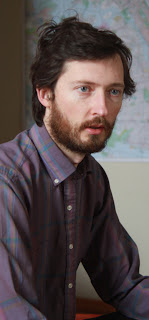TrustMovies doesn't get to travel much anymore and has never been, in any case, to the SxSW fest. So he was surprised to have the chance to view a new film that will have its world premiere there this week -- on the opening day of the fest. BAD FEVER, another in the ever-increasing mumble-core catalog, is the brainchild of one Dustin Guy Defa, who here acts as writer/director/
producer/editor and even actor, though not in the film's leading role. That task falls to another up-and-coming personage, Kentucker Audley, who has, as well, fooled around with film-making in all of the above areas, and for whom -- on the basis of what we see in Bad Fever -- acting may turn out to be his ace-in-the-hole.
It appears that I am more familiar with the work of Mr. Audley (shown at right) than I had previously thought. Not only did I view him in a subsidiary role in the film he directed, Open Five, I also saw him (without realizing that it was he) in one of the lead roles in a film -- Passenger Pigeons -- shown at BAMciné-matek during the yearly BAMcinemaFEST. In both films Audley was perfectly acceptable, though in no way memorable -- yet the latter is exactly what he is in Bad Fever. In fact, he is riveting. Why this should be so got me to ruminating yet again on the glories/
doldrums of mumblecore. When I covered Open Five (that review is here), I suggested, regarding the m'core genre, that my readers try to imagine some of our late, great actresses -- Bette Davis, Susan Hayward, Joan Crawford (or even today, Meryl Streep) -- doing a mumblecore movie. What might be the result? Not m'core, for sure. Why not? Because those actresses command the screen. It's true, film fans: charisma and mumblecore don't seem to mix.
Which bring us to back to Audley's performance. In Passenger Pigeons and Open Five, he's "truthful" enough, but he often recedes into the background scenery. The actor is "being," but he's not "doing." Being is the hallmark of most m'core performers (except, sometimes, Greta Gerwig -- hence, I believe, her move into mainstream) because being, of course, is truthful and real and honest and all that. But it's pretty passive. Eventually we need, we demand, action from our actors. And I am not talking about chasing villains by car, foot or spaceship. I mean the kind of "action" that comes from the realization -- ours and the character's -- that he or she wants something. Fortunately, eventually, filmmaker Defa -- shown above -- allows us this. And actor Audley starts pulling out the stops. But here's the weird part: He does this so haltingly, strangely, that initially, we get this from his voice more than from anything else. Also, Defa delights in the old Gus Van Sant ploy: let's photograph our hero from the back of his head because, isn't the back of the head just so full of expression?! Well, no, it's not.
For the first maybe 20 minutes, that's mostly what we see, until we keep asking what does this strange guy, with his weird vocal mannerisms, look like. Then Defa shows us some profile, and finally full-on frontal, and we see Audley in all of his character's goofy glory. And by hook or crook he has created a character (Eddie, shown above). This poor young man, who apparently has been given little in life by either of his parents (we only see his no-great-shakes mom: Annette Wright, below), is determined to prove himself via stand-up comedy -- an occupation for which he appears to have almost no credentials or gift.
Eddie meets an equally odd, though a lot nastier, young woman named Irene (played by Eléonore Hendricks, below), whom he wants to maybe "date" (as much a Eddie might understand this concept) but who has other plans for her "men." The scene, further below, in which she tries to undress our "hero" is a kind of creepy classic.
Mr. Audley seems to key everything about Eddie's desire into the young man's stammering vocal pattern (don't worry, this is nothing like The King's Speech). He makes us listen intently, while, at the same time, we're trying not to (it's so painful). The result is some-thing I have seldom encountered in a performance. But it works.
Mr. Defa takes quite a chance here, making his lead character so bizarre that were it not for Audley's ability to somehow hold us, we'd probably be elsewhere -- and fast. I asked myself rather often throughout whether someone like this could actually exist in today's world without already being in an institution. Perhaps. Eddie does seems to possess certain skills, which might help him get by. It's when he opens his mouth that it all falls apart. Nor am I sure that the film's final scene, featuring a faux-Asian masseuse named Yoko (a rather delightful Allison Baar, below) is wish-fulfillment fantasy or the embodiment of that old saying that Granny told us to allay our fears of forever being alone: There's a cover for every pot. Either way, the scene makes a predictably odd ending to this short 'n sour (77-minute) movie that is, in its strange way, quite memorable.
Bad Fever will screen at SxSW on Friday, March 11, at 8:45 at the Alamo Lamar B; on Monday, March 14, at 4pm at the Alamo Ritz 2; and on Thursday, March 17, at 3pm at the Rollins Theatre. Click here for the complete SxSW film lineup.
Sunday, March 6, 2011
Subscribe to:
Post Comments (Atom)













No comments:
Post a Comment